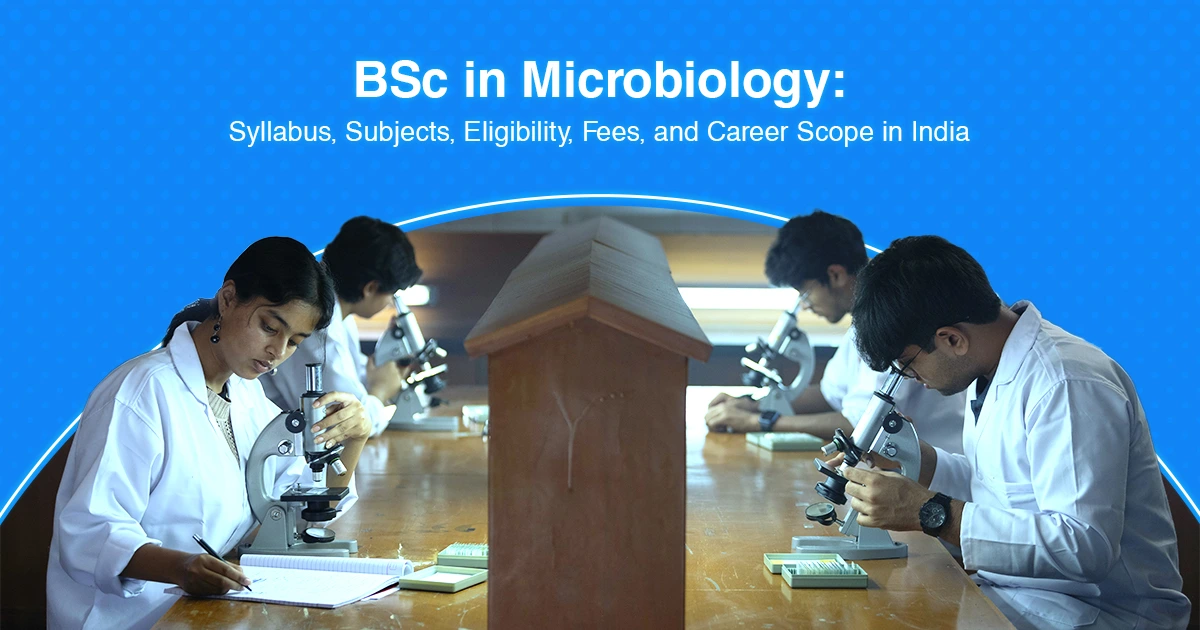Blog Detail


BSc in Microbiology: Syllabus, Subjects, Eligibility, Fees, and Career Scope in India
07-02-2025

Students who are passionate about studying microorganisms must consider pursuing a BSc in Microbiology in India. A BSc in Microbiology is a 3-year bachelor's degree programme focusing on the scientific study of microbes and microorganisms. Candidates studying the BSc in Microbiology study the effects of microorganisms on human health. Microbiology is a key element in the research fields of Pathology and Microbiology. The demand for Microbiology degree holders is rising fast as these professionals contribute to significant research on human health, diseases, environment, etc. Individuals interested in knowing the BSc Microbiology fees, BSc Microbiology eligibility, or BSc Microbiology admission or course details can scroll down and get all the essential information for the BSc Microbiology course.
BSc Microbiology Course Details
- Course Name: BSc Microbiology
- Course Duration: 3 Years
- BSc Microbiology Eligibility: Class 12th or equivalent with at least 55-60% marks. Candidates must also score the minimum required marks as per the entrance exams of the specific university
- BSc Microbiology Salary Range for Beginners: INR 3–5 Lakh
- BSc Microbiology Fees Range: INR 20,000 – INR 2,00,000
- BSc Microbiology Admission: Generally based on merit; some universities conduct separate entrance exams
Semester-wise BSc Microbiology Syllabus
Candidates can check the BSc Microbiology subjects below. The list of semester-wise BSc Microbiology subjects below may vary slightly depending on the university or college.
BSc Microbiology Syllabus Semester 1
- Introduction to Microbiology and Microbial Diversity
- Introduction to Biology
- Microbial Diversity
- Microbial Metabolism
- Enzymology
- Biostatistics
- Lab
BSc Microbiology Syllabus Semester 2
- Biochemistry
- Cell Biology
- Microbiology
- Mathematics
- Mycology and Phycology
- DNA Technology
- Bioinformatics (GE)
- Labs
BSc Microbiology Syllabus Semester 3
- Molecular Biology
- Virology
- Microbial Physiology and Metabolism
- Infection Immunity and Diagnostics
- Microbial Genomics
- Intellectual Property Rights and Ethical Issues
- Labs
BSc in Microbiology Syllabus Semester 4
- Recombinant DNA Technology
- Immunology
- Inheritance biology
- Enzyme technology
- Host-Pathogen Interaction
- Microbial Genetics
- Environmental Microbiology and Waste Management
- Food Microbiology
- Fermentation Technology
- Dissertation- II (DSE)
BSc in Microbiology Syllabus Semester 5
- Food and Dairy Microbiology
- Industrial Microbiology
- Environmental and Agricultural Microbiology
- Industrial Microbiology
- Research Methodology
- Medical Bacteriology
BSc in Microbiology Syllabus Semester 6
- Immunology
- Medical Microbiology
- Microbial Technology – Social, Legal &Ethical Issues
- Pharmacology
- Parasitology
BSc Microbiology Subjects
Microbiology is an extensive branch of Science. It covers a wide variety of subjects. The major Microbiology subjects in BSc include the following. The given subjects are integral to the BSc Microbiology syllabus.
- Immunology
- Biotechnology
- Biochemistry
- Cell Structure
- Microbial Technology
- Microbial Physiology
- Microbial Genetics
- Molecular Biology
- Biophysics and Instrumentation
- Basic Microscopy and Instrumentation
- Principles of Transmission Genetics
- Tissue Culture
- Chemistry
- Bi-Statistics
- Introduction to Data Structure
- Computer Biology & Bioinformatics
- Industrial Microbiology
- Medical Microbiology
- Environmental Biotechnology
BSc Microbiology Scope
After discussing the Microbiology syllabus in BSc, the BSc Microbiology fees structure and the Microbiology subjects in BSc, it is now time to discuss the BSc Microbiology course scope. The BSc Microbiology scope is quite extensive. After pursuing a BSc in Microbiology in India, graduates can explore the following career opportunities:
- Cellular Biologist
- Biochemist
- Immunologist
- Industrial Microbiologist
- Mycologist
- Bacteriologist
- Virologist
- Medical Microbiologist
- Food Microbiologist
After mastering the Microbiology syllabus in BSc and earning a degree in BSc in Microbiology in India, graduates can also pursue some government jobs. The BSc Microbiology salary is quite lucrative in government jobs, especially for beginners.
- Junior Research Officer
- Medical Coder
- Lab Technician
- Research Associate
- Microbiologist
Conclusion
BSc in Microbiology is an extensive course that requires dedication and hard work. Once graduates acquire a degree in Microbiology, they can explore a wide range of lucrative career options, such as research officer, microbiologist, cellular biologist, etc. A BSc in Microbiology is also a good option for those looking for government job opportunities after graduation.
FAQs
Q1: Is a microbiologist a doctor?
A1: No. A microbiologist is not a doctor but a scientist who studies microorganisms.
Q2: Is a BSc in microbiology a good career?
A2: Yes. A BSc in Microbiology is a good career choice, offering a wide range of career choices in healthcare, environment, research, agriculture, food safety, and more.
Q3: Does Microbiology require NEET?
A3: No. Pursuing a course in Microbiology does not require a National Eligibility cum Entrance Test (NEET). Admission to a Microbiology course is done based on merit and scores secured in the entrance exam.
Q4: Is there Math in Microbiology?
A4: Yes. Microbiology involves basic math, such as percentages, statistical analysis, etc. The basic mathematical operations are part of processes like data interpretation and model formulation.
Q5: Are microbiologists in demand?
A5: The job market for microbiologists is constantly growing due to rising concerns about different types of diseases, environmental issues, and antibiotic resistance.
Q6: Can I do Microbiology without NEET?
A6: Yes, you can do a BSc in Microbiology without appearing in NEET. Admission to microbiology courses is done on a merit basis.
Q7: Can I join ISRO after my BSc Microbiology?
A7: Pursuing a higher degree course like a Master’s degree in Microbiology or a PhD in Microbiology can help one grab an opportunity at ISRO (Indian Space Research Organisation (ISRO).